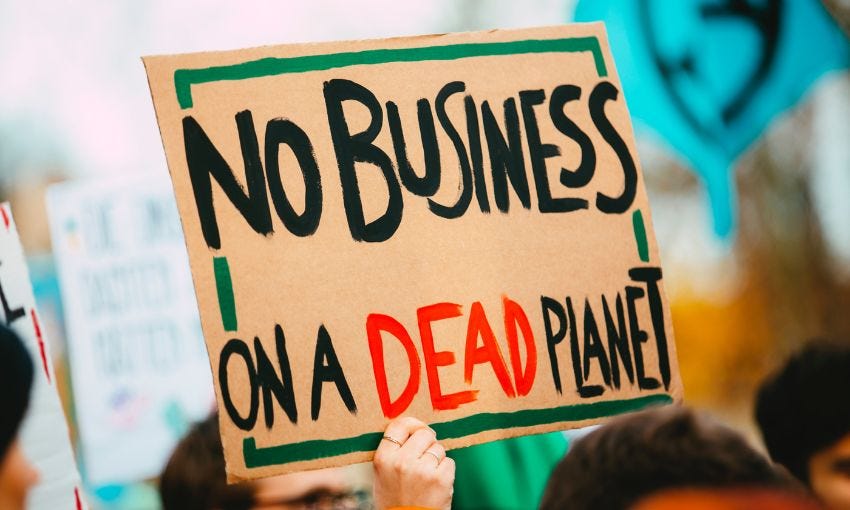The heat is on business to walk the climate talk
As we accelerate toward net zero, business will have to do more than just pay to plant trees.
Haere mai, welcome to Future Proof brought to you by Electric Kiwi.
I have to admit: the corporate world is a bit out of my comfort zone. I’m more at home in a science lab or traipsing through the bush. Or in pyjamas on the couch. But when I saw the line-up of speakers at this year’s Climate Change and Business Conference – the climate change minister! The chief executive of a fossil fuel company?! Young wāhine leading the way! – the opportunity for some hot climate takes was too good to pass up. So I donned my most business-y blazer, masked up, and headed into the city to gather up some nuggets of climate wisdom, hope and honesty. Here are four key themes that emerged on Monday.
We can’t plant our way to net zero
The world is increasingly sceptical of biological offsets, said Dr Rod Carr, chair of the Climate Change Commission. In other words: planting trees to sequester carbon is no substitute for reducing emissions in the first place. And if you’re a business relying on offsets to demonstrate your green credentials, you’ll soon be out-competed by those that have actually taken action.
“Plant and pollute” is not a sustainable approach to net zero. Yet in New Zealand, the Emissions Trading Scheme (ETS) incentivises forestry offsets instead of reductions in gross emissions, according to advice from the Climate Change Commission. In his speech, climate change minister James Shaw said that this is the sort of challenge a review of the ETS settings – as promised in the Emissions Reduction Plan – could address.
Businesses are under increasing pressure to act
While intrinsic motivation has spurred some good eggs to take climate action in the past, a whole raft of extrinsic motivators are now forcing business climate action into the mainstream. For example, international private equity firms now include climate disclosures as part of their due diligence before investing – if you’re not up to scratch, you won’t get the dosh. New Zealand businesses tend to lag when it comes to disclosures of climate risk, reduction targets and actions – but new rules for mandatory disclosure could fuel decarbonisation. “You’ll hear the capital talking once the light is shining in this space,” said April Mackenzie, chief executive of the External Reporting Board.
There’s also a global eye on greenwashing: Carr has served on a UN expert group tasked with investigating the legitimacy of net zero pledges, with results delivered in time for COP27 later this year. And if you’re not walking the climate action talk, you’ll lose out on values-driven young talent. Dewy Sacayan from Generation Zero told the crowd that all her friends now want to work for Patagonia, after its billionaire owner gave the company to a trust dedicated to fighting climate change.
The transition must be just
“For many whānau, it’s irrelevant that there’s a discount for electric vehicles, when that discount is more than they would spend on a car,” said Grant Kemble, chief executive of Ngāti Whātua Ōrākei Whai Rawa. As we shift from fossil fuels, we’ve gotta make sure the journey is inclusive, collective and collaborative. Anahera Nin from Ngāti Toa challenged businesses to connect with their local mana whenua, and ask how they could support the iwi/hapū’s climate change kaupapa. “Whakarongo mai ki te rangatahi. Whakarongo mai ki te mana whenua,” Nin said.
We’re not just cutting, we’re building
As emissions drop, what do we actually want? What will your business look like in a world free of fossil fuels? Dr Christina Hood from Compass Climate challenged businesses to start envisioning a zero-emissions society – not just setting reduction targets and trying to reach them. Some panel speakers mentioned degrowth – the idea that we live on a planet with finite resources, which means our economies and GDP can’t grow indefinitely. Auckland mayor Phil Goff imagined a “back to the future” scenario where kids walk and bike to school, harking back to his childhood memories of a car drop-off being seriously uncool: “What a wuss you’d be, if you got dropped off at school!” he said.
Drive more savings from your EV with Electric Kiwi’s MoveMaster
If you drive an electric car, Electric Kiwi’s MoveMaster plan is your ideal power option. The plan includes half-price rates overnight (11pm-7am) and cheaper off-peak day rates. And you’ll still get Electric Kiwi’s famous free off-peak Hour of Power.
Making small changes to your energy usage habits can be good for you and the environment. Check out MoveMaster today to see how much you could be saving.
Where does the climate figure in local government elections?
There’s plenty of conspiracy-talk bubbling away in the local elections, but where’s the climate talk? The majority of mayoral candidates say they’d front some funds to combat climate change, reports Conan Young for RNZ. A bunch of unions and other organisations have banded together to collate candidates’ views on climate action here, while Generation Zero have compiled candidates’ climate justice scorecards here. Plus you can check out Policy.nz to get the lowdown on candidates running in your rohe.
Homegrown efforts to grapple with gases
A partnership between Ngāti Pūkenga and a marine scientist from the University of Waikato is investigating whether a type of rock called dunite, crushed up and sprinkled on soil, can be used to soak up carbon on farms, Eloise Gibson reports for Stuff.
Olivia Wannan, also at Stuff, discusses a proposal to build a factory in Kawerau that could destroy climate-destroying fluorinated gases recovered from whiteware like heat pumps.
Revealed: the emissions saved by switching to an EV
Stuff’s Olivia Wannan crunches the numbers on total greenhouse gas emissions for a petrol-powered car compared to an EV. As we’ve discussed previously in Future Proof, EVs currently have higher manufacturing emissions than a classic internal combustion engine, but much lower lifetime emissions once the actual driving is taken into account. The article also canvasses the emissions of other everyday materials, like steel and glass, as well as some emerging tech “on the horizon”.
While it’s awesome that one in every five new cars sold in New Zealand is an EV, Hayden Donnell points out on The Spinoff that EVs won’t unclog our choked motorways, and rebuts the arguments of those who claim we’re too wedded to cars to embrace other transport modes. Au contraire, engineers have a long history of manipulating our transport choices!
Germany experiments with cheap public transport
In one such example of shaping transport decisions, Germany instituted a special €9 train ticket for three months over their summer, in an attempt to relieve the biting pressure of energy costs. The subsidised ticket was valid for one month of travel on all trams, buses and trains, nationwide. Thanks to the ticket, a fifth of Germans used public transport regularly for the first time. Air pollution dropped 6-7% and an estimated 1.8 million tonnes of emissions were avoided. The cheap ticket scheme came to an end on 31 August, but decision makers are keen to experiment with similar initiatives to encourage more public transport use.
More stories:
Biodiversity is quickly gaining traction in responsible investing alongside climate: “There is no route to net zero without biodiversity.”
Switching to renewables could save the world $12 trillion by 2050, according to a new study.
The Lake Taupō supervolcano has been raised to alert level 1 (minor unrest) after a swarm of small earthquakes. But don’t worry, experts say an eruption is “very unlikely” and there’s no cause for alarm. NZ Herald’s science reporter Jamie Morton has an explainer (paywalled).
Urban trees provide cooling shade, but more than 1,000 tree species commonly planted in cities are threatened by rising temperatures and changing rainfall patterns, according to a new analysis.
Grist has compiled The Climate Future Cookbook, featuring eight hero ingredients (and recipes) in an exploration of what climate-resilient eating might look like.
Kina have been removed from four locations in the Marlborough Sounds in a project to investigate restoring kelp reefs.

To finish this issue: the birds are back. Kōtuku white herons are converging on their nesting grounds at Okarito for the breeding season. Im-peck-able #BirdOfTheYear content is starting to trickle through on social media. The kuaka godwits are returning home to New Zealand for the summer after breeding in the tundra of Alaska. Some kuaka are tracked during this epic migration: 4BBRW is part-way through his trans-Pacific flight. Last year, 4BBRW set a record for the longest continuous flight of any land bird, travelling non-stop for more than 13,000km in just under 10 days. And finally, meet Steve: he wants to be the first kākāpō to fly.
Tweet dreams,
Ellen
Got some feedback about Future Proof or topics you’d like covered? Get in touch with me at futureproof@thespinoff.co.nz













